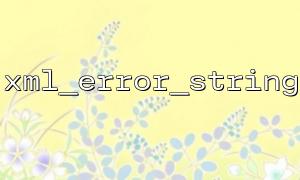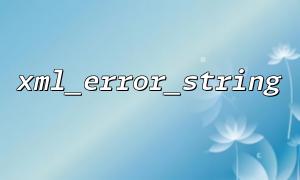xml_error_string() is a function used to obtain error information corresponding to a single XML error code. Its input parameter is an error code (integral), which returns the text description of the corresponding error code.
Only convert to string descriptions for a single error code.
Error codes usually come from error constants in libxml.
You need to pass in the error code manually, and you cannot directly obtain all current errors.
<?php
$errorCode = 5; // Assume an error code
echo xml_error_string($errorCode);
// Output example: "Premature end of data in tag"
?>
This function is suitable for use when you have caught an error code and need to convert it into a human-readable error prompt.
libxml_get_errors() is a function that gets all errors in the current libxml parsing process. It returns an array containing all error objects, each object describes the error information, line number, column number, error code, etc. in detail.
The returned is an array of error objects, containing detailed information.
Suitable for batch get all parsing errors.
Usually used with libxml_clear_errors() to prevent error accumulation.
You need to enable libxml error capture mode ( libxml_use_internal_errors(true) ).
<?php
libxml_use_internal_errors(true);
$xmlString = '<root><item></root>'; // Written by intentionally XML
$doc = new DOMDocument();
$doc->loadXML($xmlString);
$errors = libxml_get_errors();
foreach ($errors as $error) {
echo "error message: " . $error->message . "\n";
echo "The line number: " . $error->line . "\n";
}
libxml_clear_errors();
?>
| Function | xml_error_string() | libxml_get_errors() |
|---|---|---|
| enter | Single error code (integer) | No parameters, return all current error arrays |
| Output | Description of string corresponding to error code | Error object array (including detailed information of messages, codes, rows, etc.) |
| Error capture mechanism | No additional settings are required, simply map error codes | You need to call libxml_use_internal_errors(true) first |
| Applicable scenarios | Used when you need to convert a known error code to a string | Used when you need to get all the current parsed errors |
| Whether batch support | no | yes |
This function is suitable when you have a specific error code and want to display detailed error information.
Suitable for custom error handling flows, or error code translation when used in combination with other functions.
But it does not catch or return an error itself, and you need to have the source of the error code.
When you parse XML using PHP's DOM or SimpleXML and need to check for all potential errors, it is suitable to use it to get all detailed errors.
Suitable for debugging complex XML parsing processes and obtaining multiple error records.
Used in conjunction with libxml_use_internal_errors(true) to avoid default error throwing or warnings, and facilitate unified processing within the program.
xml_error_string() is a tool function that "error code to string" that focuses on translating a single error code into human-readable information.
libxml_get_errors() is a tool for "get all errors currently parsed" and is more suitable for real-time capture and handling of multiple XML parsing errors.
In general scenarios, it is recommended to use libxml_use_internal_errors(true) + libxml_get_errors() to capture and analyze parsing errors; if you need to explain a specific error code, then use xml_error_string() to assist with the explanation.
By rationally selecting and using these two functions, the experience of PHP handling XML errors and the robustness of the program can be greatly improved.

